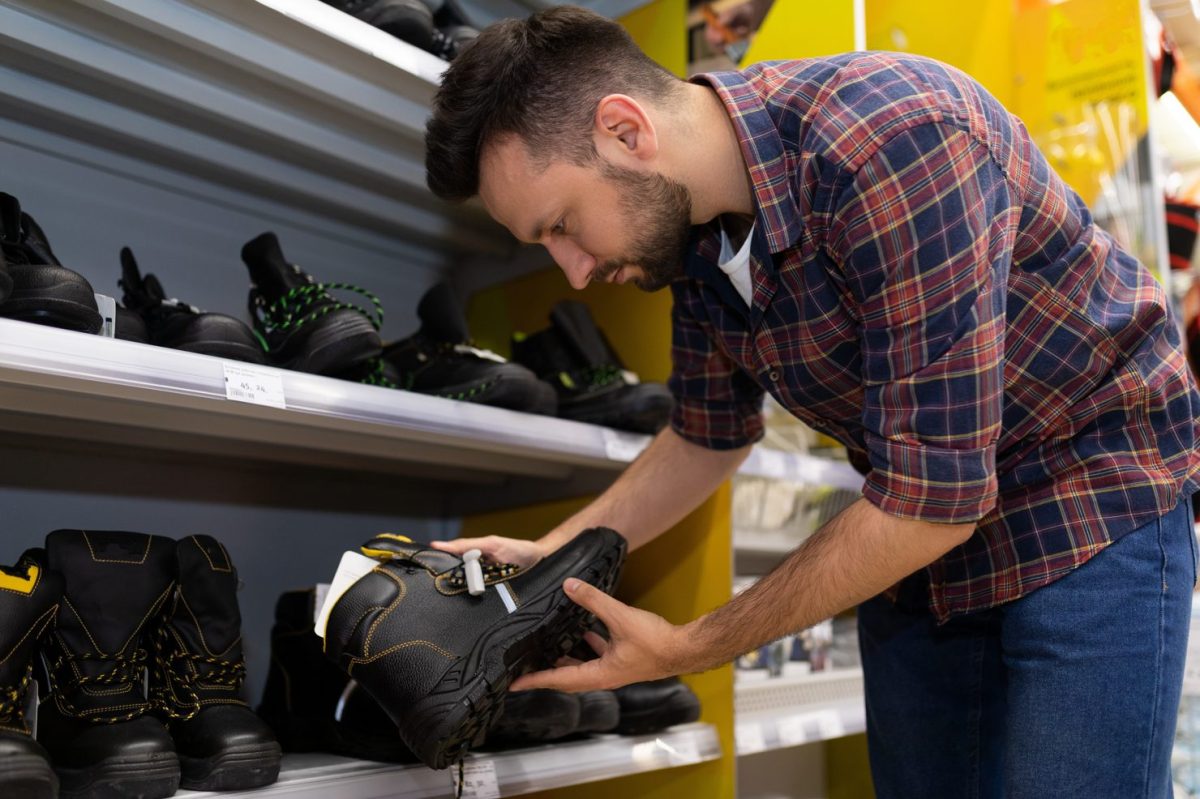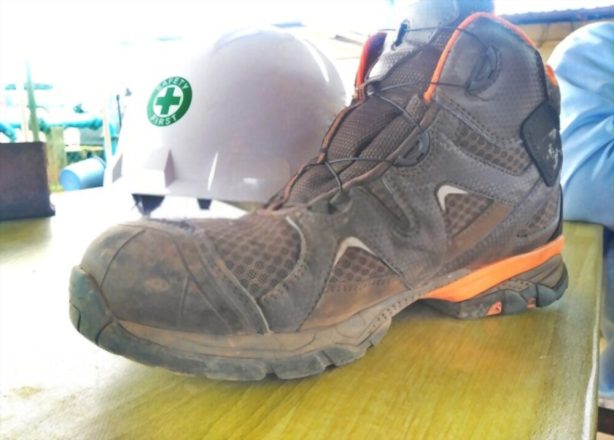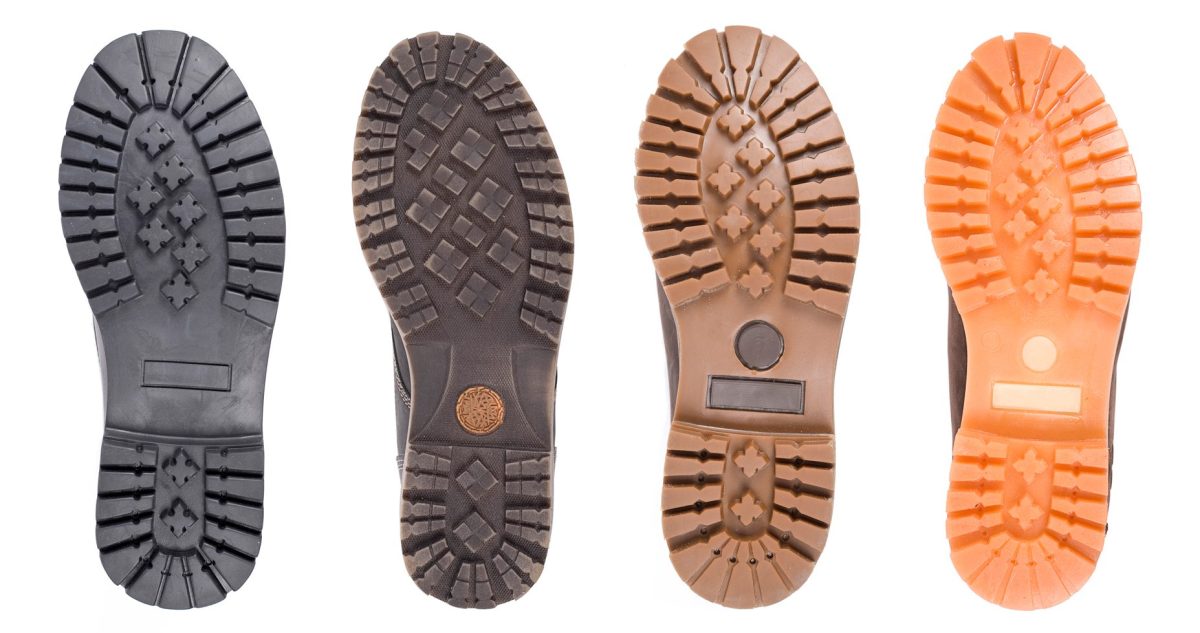If you work as a mechanic in an automotive garage or workshop, you are aware that your job exposes you to a wide range of hazards. There are numerous heavy devices that can fall on your toes and instep at any time and injure your feet. Not only that, but heavy equipment can roll over your feet too, causing serious injury if you are not wearing safety work boots. The workshop surface is also not your buddy spills of gasoline, oil, grease, and even water can induce you to slip, fall, and possibly injure yourself.
All of those reasons require you to get proper safety footwear for your meat plates. You can keep your feet from incidents, injuries, and take on repair work with assurance if you wear the best work boots for mechanics.
There are numerous mechanics’ work boots available on the market right now. There is a wide range of great options available out there. Therefore, you may feel intimidated in your search for a pair of work boots for mechanics that meets both your demands and your wallet as well. So, to assist you, I have compiled a list of the 10 best work boots for mechanics. I have also included some essential aspects to consider when shopping for these types of work boots, as well as their advantages.
See more: How To Choose Wide Running Shoes in here
What Are The Best Work Boots For Mechanics?

In fact, there are no “standard” features for footwear to become the best work boots for mechanics. There will be few differences between different automotive garages or workshops. Besides, each mechanic will be responsible for certain tasks. So, there will not be a “one-for-all” pair.
But the best option among so many choices out there might be the Thorogood American Heritage 6-Inch Steel Safety Toe Work Boots for Mechanics. But if you prefer composite safety toe work boots, you can consider the Carhartt Men’s CMF6371 Rug Flex Composite Toe Work Boots for Mechanics.
And now, it’s time to look at the list of the 10 best work boots for mechanics.
| Work Boots For Mechanics | Materials | Safety toe | Weight (item/package) | Size |
| Thorogood American Heritage 6-Inch Steel Safety Toe Work Boots for Mechanics | Oil-tanned full-grain leather, Maxwear wedge | Steel safety toe caps | 5.2 lbs | 7 – 14 Wide |
| WOLVERINE Men’s Overpass 6-Inch Composite Safety Toe Work Boots for Mechanics | Water-resistant leather and textile, rubber | Composite safety toe caps | 1.75 lbs | 7 – 14 (extra-wide available) |
| Timberland PRO Men’s Boondock Composite Toe Work Boots for Mechanics | Ever Guard leather, PU, synthetic | Composite safety toe caps | 2 lbs | 7 – 15 Wide |
| Carhartt Men’s CMF6366 6’’ Composite Safety Toe Work Boots for Mechanics | Leather, rubber | Composite safety toe caps | 4.3 lbs | 8 – 15 Wide |
| Timberland PRO Men’s Power Welt Steel Toe Work Boots for Mechanics | Ever Guard leather, rubber | Asymmetrical steel safety toe caps | 2 lbs | 5 Wide – 15 Wide |
| Carhartt Men’s CMF6371 Rug Flex Composite Toe Work Boots for Mechanics | Oil-tanned leather, rubber | Composite safety toe caps | 4 lbs | 8 – 15 Wide |
| ROCKROOSTER Men’s 6-Inch Steel Toe Work Boots for Mechanics | Oiled full-grain tumbled leather, TPU rubber | Steel safety toe caps | 3.73 lbs | 4 X-Wide – 15 X-Wide |
| Timberland PRO Men’s 6’’ Rigmaster XT Steel Safety Toe Work Boots for Mechanics | Leather, synthetic | Steel safety toe caps | 2.2 lbs | 5 Wide – 15 Wide |
| Irish Setter Men’s 6-Inch Heat Resistant 83606 Aluminum Toe Work Boots for Mechanics | USA-made full-grain leather, EVA rubber | Aluminum safety toe caps | 2.06 lbs | 7 – 14 (wide available) |
| Cat Footwear Men’s Second Shift Steel Safety Toe Work Boots for Mechanics | Leather, synthetic | Steel safety toe caps | 2.4 lbs | 7 – 14 (wide available) |
Buying Guide: How to Choose the Right Work Boots for Mechanics?

Working in the auto industry exposes you to a wide range of potential hazards. There is equipment, machinery that can drop on your toes and feet anytime, or heavy vehicle components that can land on your toes, and slick, wet surfaces that can cause you to slip or fall.
There is not just security to think about as you should consider the comfort factor too. You’ll most likely be on your feet or bending down with your feet bent for a long period of time.
Wearing the best work boots for mechanics will make sure that you are doing everything possible to keep your feet safe. When looking for mechanic or automotive work boots, you should remember the following features:
Toe Protection

It is critical to keep your toes safe. You can be certain that no matter how cautious you are, when accidents occur, your toes will undoubtedly be in the front line. There are basically three types of protective toe caps:
Steel safety toe caps: Steel, as you might all know, is a sturdy and resilient material that is frequently used to protect the sensitive bones in your feet. Because they are tough and enduring, these safety toe caps have long been the preference of many protective/safety boots or shoes. They are a little bit heavier than several alternatives, which adds some weight to your boots.
Alloy safety toe caps: These are made from different materials such as aluminum or titanium combined with other metallic materials and provide the same level of protection to steel toe caps. While alloy toe caps are a bit thicker than steel ones, they are normally 30 to 50% more lightweight in weight. Besides, you can easily find these alloy toe caps in sneaker-style protective/safety work boots.
Composite safety toe caps: are made from materials such as plastic, fiberglass, carbon fiber, or Kevlar. They are, once again, bulkier than their equivalents, but they are extremely lightweight. Because they comprise no metals, they are a great option if you work in an environment with electrical shocks.
This video explains the differences between some popular types of safety toe caps.
Soles

When searching for excellent soles for your best work boots for mechanics, three elements come into play:
Flexibility: Working on vehicle types can require a lot of bending and squatting. This can put a strain on the midsoles of your work boots. So, while you need them to be pliable, you might also need them to be sturdy; otherwise, they may deteriorate in this area.
Slip resistance: Floors at automotive garages can be dangerously slippery. For instance, water, oil spills, and other chemical products can turn them into ice rinks. Profound lugs in a slip-resistant rubber sole will keep you stable on your feet.
Electrical hazard rating: Machine tools and other electronic devices are plenty in a garage or workbench. When something goes wrong, making sure your mechanic’s work boots or shoes are rated for electrical hazards standards will keep you safe from potential electrical stimulation.
Insoles
Working on your feet for long periods of time every day is a necessary part of the job of a mechanic. You must ensure that your feet have the necessary support to keep them comfy. Numerous work boots include insoles that are specifically designed to support the heels and arches and inhibit foot fatigue and pain.
Insoles are commonly detachable. This is especially beneficial if you have foot issues such as Achilles tendonitis, high arches, heel spurs, or metatarsalgia, etc. You can replace the insoles with some that are more relaxed and comfier for your feet.
Stability

Make sure the work boots you intend to purchase are stable. You may be required to carry huge items at times, and your hands may not be free to keep the balance. In such an event, you might need a sturdy pair of mechanic work boots to keep you from falling because you will not be likely to grip on anything to avoid a horrible tumble.
Durability
You work in a harsh condition, which is why you should invest in a pair of long-lasting work boots. The last point you need is a pair of work boots that will only last a few months. Generally speaking, genuine leather is an ideal material for work boots because it can withstand the abuse that occurs in the garage on a daily basis.
How the upper and the sole are bonded together is also really crucial in this matter. In other works, shoe construction methods are also an important attribute when it comes to the durability of the best work boots for mechanics. It might help you know how long your boots will last in harsh working conditions.
View more: How To Choose Shoes For Peloton Bikes in this post
Safety Standard for Mechanic Work Boots

When you are in search of the best work boots for mechanics, you may come across different ASTM ratings. For those who don’t know, the American Safety Standards for Work Boots establishes these.
ASTM F2413-11 is the most prevalent, accompanied by any of the letters and numbers such as C/75, I/75, EH, PR, SD, SR. But what exactly does this imply?
The standard for work boot safety is designated by the number ASTM F2413-11.
The I/75 rating denotes the amount of impact resistance the work boots have. That means you will be fine if you drop anything weighing 75 pounds on your toe caps. They will leave 0.47-inch clearance in women’s work boots, while this number for men’s boots is a 0.5-inch clearance.
The C/75 refers to toe cap compression. It indicates that even if things weighing 2,500 lbs (1,134 kg) roll over your toes, you will still have 0.5 inch of clearance.
The letters EH are another feature of ASTM 2413. This means that the boots can endure 18,000 volts at 60 hertz for one minute under dry conditions. This helps to protect you from electrical stimulation that is unintentional.
The letters SD denote that the boot can disperse static electricity. Slip resistance, on the other hand, is denoted by SR, and puncture resistance is denoted by PR.
Find more: How To Choose Work Boots For Security Guards in this article
What Else Should You Look For In The Best Work Boots for Mechanics?

A lot of qualities you will need in your work boots to work as a mechanic have already been mentioned above. Consider the following in addition to these:
Sole materials: Rubber is a flexible material, and substances like Vibram may be durable as well. Look for profound lugs or grooves to provide extra traction.
Support: Work boots with higher shafts tend to give your ankles more support and keep them from possible twisting. This spot will be more comfortable with padding. Consider my recommendation on insoles to ensure that your feet are padded and shielded from shocks and impact.
Water resistance: Being able to endure water suffusing your work boots is advantageous if you are washing vehicles or working outside in wet conditions. It will aid in keeping your feet dry.
Odor control: Wearing work boots all day long can induce your feet to perspire, and infectious agent stinky feet thrive in moist environments. So, it is best to look for antimicrobial treatments that aid in the control of odors.
Moisture-absorbing lining: Liners that wick sweat away from your feet will help maintain them dry, clean, and fresh. They can also help you prevent the possibility of blisters.
Frequently Asked Questions
In this part, you will get answers to some of the most popularly asked questions about the best work boots for mechanics.
Why is it necessary for mechanics to wear special work boots?
These work boots meet three requirements for mechanics: protection, comfort, and sturdiness. It is quite hard to choose the best work boots with the best safety attributes, with a design that provides orthopedic advantages and solace during long periods of work, as well as the long-term durability of the materials used to construct the work boots.
Is it necessary for auto mechanics to wear steel toe work boots?
A pair of steel safety toe work boots is ideal for optimum toe safety, even if steel toes can make the boot a little bit heavier. A waterproof or oil-resistant work boot, possibly with a rubber outsole, can provide reliable slip resistance. As such, you can rest assured that any possible future falls will be greatly reduced.
Are work boots for mechanics equipped with insulation?
These work boots can be insulated with Thinsulate or other types of insulation. Usually, it is Thinsulate that ranges between 200g to 800g. A boot with 200g of Thinsulate should suffice in the mild cold. At the same time, 800g of Thinsulate is for cold, icy and windy conditions.
Are wedge-sole work boots appropriate for mechanics?
If you work in construction, auto mechanics, factories, or something similar, you might find those wedge-sole boots to be an excellent option in hardworking boots. In other words, you can also wear wedge-sole work boots if you are a mechanic.
Can you make special orders for mechanics’ work boots?
Yes, of course. These work boots can be custom-made if you need a proper fit or a larger size. Supination can be caused by high arches, so people who wear boots should wear cushioned shoes. Stability boots are required for individuals with normal feet. For pronation, individuals with flat feet require motion control boots. Others who may have sesamoiditis, bunions, plantar fasciitis, and other foot problems will also take advantage of made-to-order service to get the most suitable fit.
My Top Pick
Wearing the appropriate work boots for the job can assist in keeping your feet safe and comfy all day long. Picking any pair from our best work boots for mechanics will make sure you get both these benefits.
Ultimately, the final decision is still up to you. But in general, the best overall option that is ideal for almost any situation and requirement might be the Thorogood American Heritage 6-Inch Steel Safety Toe Work Boots for Mechanics. These boots are simply beautifully designed, highly protective, and comfortable.
A good pick for those who prefer lightweight with enough safety is the Irish Setter Men’s 6-Inch Heat Resistant 83606 Aluminum Toe Work Boots for Mechanics.

